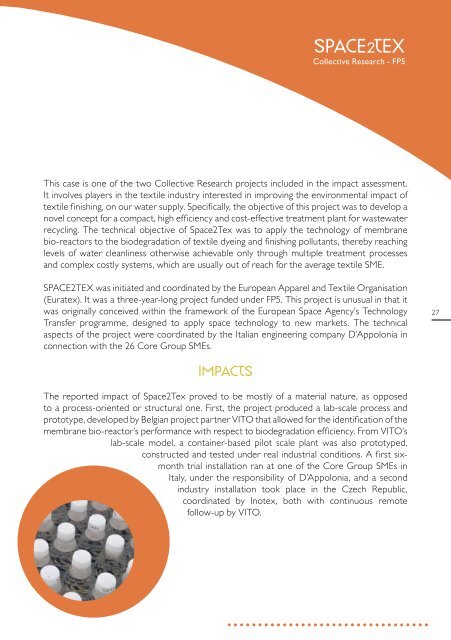SMEs and Research - European Commission - Europa
SMEs and Research - European Commission - Europa
SMEs and Research - European Commission - Europa
Create successful ePaper yourself
Turn your PDF publications into a flip-book with our unique Google optimized e-Paper software.
SPACE2TEX<br />
Collective <strong>Research</strong> - FP5<br />
This case is one of the two Collective <strong>Research</strong> projects included in the impact assessment.<br />
It involves players in the textile industry interested in improving the environmental impact of<br />
textile finishing, on our water supply. Specifically, the objective of this project was to develop a<br />
novel concept for a compact, high efficiency <strong>and</strong> cost-effective treatment plant for wastewater<br />
recycling. The technical objective of Space2Tex was to apply the technology of membrane<br />
bio-reactors to the biodegradation of textile dyeing <strong>and</strong> finishing pollutants, thereby reaching<br />
levels of water cleanliness otherwise achievable only through multiple treatment processes<br />
<strong>and</strong> complex costly systems, which are usually out of reach for the average textile SME.<br />
SPACE2TEX was initiated <strong>and</strong> coordinated by the <strong>European</strong> Apparel <strong>and</strong> Textile Organisation<br />
(Euratex). It was a three-year-long project funded under FP5. This project is unusual in that it<br />
was originally conceived within the framework of the <strong>European</strong> Space Agency’s Technology<br />
Transfer programme, designed to apply space technology to new markets. The technical<br />
aspects of the project were coordinated by the Italian engineering company D’Appolonia in<br />
connection with the 26 Core Group <strong>SMEs</strong>.<br />
IMPACTS<br />
The reported impact of Space2Tex proved to be mostly of a material nature, as opposed<br />
to a process-oriented or structural one. First, the project produced a lab-scale process <strong>and</strong><br />
prototype, developed by Belgian project partner VITO that allowed for the identification of the<br />
membrane bio-reactor’s performance with respect to biodegradation efficiency. From VITO’s<br />
lab-scale model, a container-based pilot scale plant was also prototyped,<br />
constructed <strong>and</strong> tested under real industrial conditions. A first sixmonth<br />
trial installation ran at one of the Core Group <strong>SMEs</strong> in<br />
Italy, under the responsibility of D’Appolonia, <strong>and</strong> a second<br />
industry installation took place in the Czech Republic,<br />
coordinated by Inotex, both with continuous remote<br />
follow-up by VITO.<br />
27
















